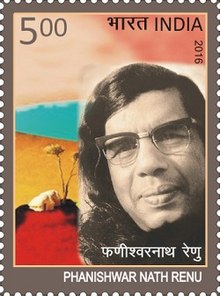Phanishwar Nath Renu | |
|---|---|
 | |
| Born | 4 March 1921 Araria, Bihar, India |
| Died | 11 April 1977 (aged 56) |
| Occupation | Novelist, memoirist |
| Notable works | Maila Anchal (The Soiled Linen, 1954) |
| Spouses | Rekha, Padma and Latika Renu |
| Children | Kavita Roy, Padam Parag Venu, Navneeta, Aparajit, Dakshineshwar Prasad Rai |
| Father | Sheela Nath Mandal |
Phanishwar Nath Mandal 'Renu'[1] (4 March 1921 – 11 April 1977) was one of the most successful and influential writers of modern Hindi literature in the post-Premchand era. He is the author of Maila Anchal, which after Premchand's Godaan, is regarded as the most significant Hindi novel.[2] Phanishwar Nath (Mandal) Renu was born on 4 March 1921 in a small village Aurahi Hingna near Simraha railway station in Bihar. The mandal community of Bihar to which Renu belonged constitutes an under-privileged social group in India. Renu's family, however, enjoyed the benefits of land, education, and social prestige. Renu's father, Shilanath Mandal, had been active in the Indian National Movement and was an extremely enlightened individual, taking a keen interest in modern ideas, culture and art.[3]
Phanishwar Nath Renu is best known for promoting the voice of the contemporary rural India through the genre of Aanchalik Upanyas ('regional story'), and is placed amongst the pioneering Hindi writers who brought regional voices into the mainstream Hindi literature. Renu was very close associate of Bengali novelist Satinath Bhaduri. He wrote a memoirs named Bhaduriji (Mr. Bhaduri) in Bengali.[3]
His short story "Maare Gaye Gulfam" was adapted into a film Teesri Kasam (The Third Vow),[4] by Basu Bhattacharya (produced by the poet-lyricist Shailendra) in 1966 for which he also wrote the dialogues.[5] Later his short story "Panchlight" (Petromax) was made into a TV short film. The 2017 Bollywood Film Panchlait is also based on this short story.[6]
- ^ Cite error: The named reference
padmawas invoked but never defined (see the help page). - ^ Phanishwar Nath Renu profile Seasoninindia.
- ^ a b Introduction by Anand Prakash (2007). Freed from disgrace = Kalankmukti. new delhi: Oxford University Press. p. 2. ISBN 978-0-19-568599-2.
- ^ TISRI QASAM The Third Vow University of Iowa, 2005.
- ^ Phanishwar Nath Renu at IMDb
- ^ "Phanishwar Nath Renu's short story on silver screen". 17 October 2017.